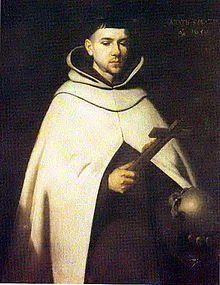St John of the Cross

Carmelite friar, and one of Spain's foremost poets, mystics and theologians.
John was born in Toledo in 1542 to a noble but poor family. He was brought up by his mother, went to a poor school, and was then apprenticed to a silk weaver. He had little aptitude for this trade and in 1563 joined the Carmelites. He studied theology and was ordained priest in 1567.
St Theresa of Avila persuaded him to join the Discalced Reformed Order which she had initiated for nuns and friars. For a time John lived in the house of Duruelo. In 1571 he became rector of Alcala, a study house attached to the university, and was also confessor to the nuns of Avila.
But in 1571 he was seized and imprisoned by the Calced Carmelite Friars who rejected the reformed order. They kept him incarcerated in terrible conditions in Toledo, for nine months. It was during this time that he wrote some of his most beautiful poetry. After managing to escape, he went to Baeza where he founded a college. In 1582, the year his friend St Theresa died, he became Prior at Granada. In 1588 he took over at Segovia.
John suffered during the last years of his life at the hands of the Discalced Carmelite Vicar General Nicholas Doria. A victim of jealousy and power politics, he was deprived of his office and banished to Ubeda in Andalusia where he died in 1591.
St John was small physically but among poets and mystics he was a giant, combining a deep poetic sensitivity with highly developed philosophical thought. His spiritual works, written as commentaries on his poems, stress the need for active asceticism as well as the far deeper purification of the soul by divine grace. Through a life of pure faith and love of God the soul eventually attains the deepest mystical union.
St John's writings are theologically substantial and he is regarded not only as a mystic but as a supreme Doctor of Mystical Theology. He was beatified in 1675 and canonised in 1726. 200 years later he was declared a Doctor of the Church.












